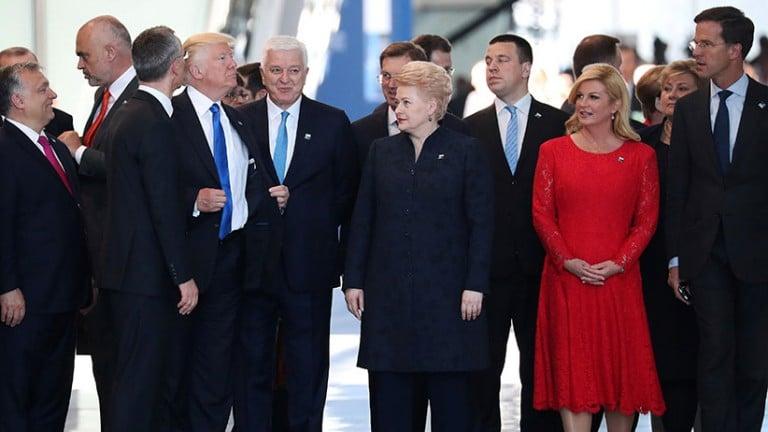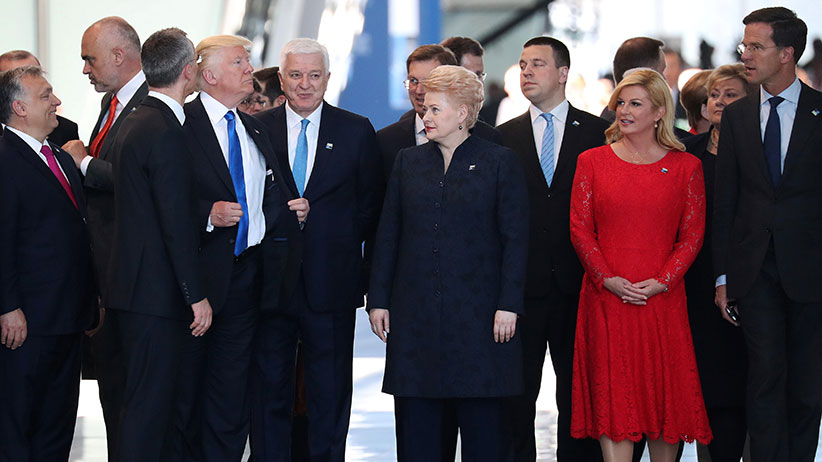Donald Trump’s farewell tour
The world has taken measure of the president and found a person not to be taken seriously. It’s the end of the American century.

U.S. President Donald Trump adjusts his jacket after pushing past Montenegro Prime Minister Dusko Markovic the NATO Summit in Brussels, Belgium, May 25, 2017. (Kevin Coombs/Reuters)
Share

There is a tradition among embassy staff called the “Wheels Up Party”. An official overseas visit by a president or prime minister will inevitably mean months of gruelling preparatory work. The diplomats, security staff and advance teams from the home capital will exhaust themselves ensuring even the smallest detail has been planned out, tested and tested again before the delegation arrives.
When the leader is finally in town, it is not uncommon for embassy staff to work 24 hours straight, keeping track of every moving part, adjusting on the fly and praying that nothing goes wrong. Then, after the meetings have met and the sites have been seen, they will stand on the tarmac to watch their leader board his airplane, taxi and takeoff.
And when they can see the wheels on the aircraft retract, meaning their VIP is officially someone else’s problem now, there is a collective whoop of relief, and everyone heads back to the embassy to crack into the duty-free liquor for the biggest party of the year.
WATCH:
I imagine the Wheels Up parties at the American embassies in Saudi Arabia, Israel, The Vatican, Brussels and Italy this week, after President Donald Trump flew off on Air Force One, were among the biggest in living memory. I cannot think of another visit by an American leader that was in as much peril of going horribly, horribly wrong. But to the relief of many and surprise of more, it didn’t. When you think of the possible misadventures, I must assume that the mood among American diplomats was joyous.
There were still a few cringing gaffes, of course. At the NATO summit, for example, the world was treated to the sight of Trump pushing other leaders out of the way so he could preen in front of the cameras. If Alec Baldwin had acted out the scene during one of his Saturday Night Live appearances, it would have been too over-the-top to get a laugh.
We were looking so hard for these sorts of pratfalls that some important items were largely ignored. Consider that Trump chose Saudi Arabia as his first overseas visit, committed to an unprecedentedly large arms deal with Riyadh, and then invited almost every Sunni leader in the world to listen to his speech. America is now officially picking sides in the Middle East’s long and bloody Shia/Sunni rivalry. This is a move that will inevitably only increase tensions in the Middle East.
In Israel, Trump revelled in one of the coziest visits in decades between a sitting U.S. president and an Israeli leader. One White House press release had the dateline “Jerusalem, Israel” which, in the arcane world of diplomatic subtleties, was a big step towards the United States recognizing that city as the Israeli capital—another move that will only increase tensions in the region.
But even these diplomatic developments were not the real story. While Trump was feted in the Middle East, he was treated with surprising indifference in Europe. For the first time since the Second World War, an American president stood among allies, not as a first among equals, but almost like an outsider—someone who had to be invited, but who no one really was going to take very seriously.
At one point, Trump used a commemorative address to instead complain that NATO allies were being unfair to “American taxpayers”. The other leaders standing nearby exchanged wry looks; a few even seemed to roll their eyes. By all accounts, there was no scramble to appease the president, no panic among delegations about how to “defuse” the American anger. No one really cared that much. Likewise, when the president refused to endorse the Paris Climate Agreement, or NATO’s policy of mutual defence, no one was willing to bend even a little to mollify the Americans. They shrugged.
READ MORE: Trudeau’s G7 agenda meets Donald Trump’s worldview
Even a month ago, the reaction would have been entirely different. When Trump came to power there was universal agreement he had to be treated with kid gloves, he had to be taken seriously, otherwise who knows what chaos he would unleash. But now, no one seems especially worried. Rapidly, over the last few weeks, America’s rivals and allies stopped seeing the United States as the “indispensable nation” whose opinion mattered, whose approval was always necessary.
What changed? The world has a much better measure of the man now. They see him as inconsistent—even if you convinced him on Monday to support the Paris deal, he will quite likely repudiate it Tuesday morning in a tweet. He has also proven so ineffective in controlling the bureaucracy and even his own party, it is unlikely that a repudiation will change much any time soon.
And beneath all of that is Trump’s unprecedented ignorance—Merkel at one point was reduced to showing him a map of the former Soviet Union to explain Russian objectives in Eastern Europe. What is the point of trying to get his support on one issue or another when he has literally not even read the summary of the relevant briefing note?
Trump’s first world tour may well end up also being his farewell tour. Not because it will be his last, although with the accelerating pace of the Russian scandal that is not impossible. But rather because it marked the official end of the American century—when Air Force One took off and finally headed back to Washington, it left behind a new world where the United States no longer counts, where America has effectively abandoned the field to Europe, China, and Russia. Wheels up.